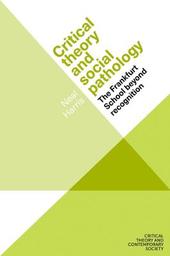
|
Critical Theory and Social Pathology: The Frankfurt School Beyond Recognition
Hardback
Main Details
| Title |
Critical Theory and Social Pathology: The Frankfurt School Beyond Recognition
|
| Authors and Contributors |
By (author) Neal Harris
|
| Series | Critical Theory and Contemporary Society |
|---|
| Physical Properties |
| Format:Hardback | | Pages:200 | | Dimensions(mm): Height 234,Width 156 |
|
| Category/Genre | Ethics and moral philosophy
Social and political philosophy |
|---|
| ISBN/Barcode |
9781526154736
|
| Classifications | Dewey:301.01 |
|---|
| Audience | | Tertiary Education (US: College) | | Professional & Vocational | | General | |
|---|
|
Publishing Details |
| Publisher |
Manchester University Press
|
| Imprint |
Manchester University Press
|
| Publication Date |
22 November 2022 |
| Publication Country |
United Kingdom
|
Description
This book provides a concise overview of the social theoretical foundations of Critical Theory. The social-theoretical foundations of critical theory have crumbled. This is a result of the unchecked embrace of an aggressive variant of 'recognition theory'. While first-generation critical theorists grasped the potency of structural power as a force that reified thought, denatured the imagination and recoded desires, recognition theory views power as a post-hoc effect that exists only after intersubjective relations have been established. This is a troubling state of affairs and has led to the debilitation of the Frankfurt School's research programme. New and secure social-theoretical foundations are urgently needed. In this regard, the work of first-generation critical theorists such as Erich Fromm and Herbert Marcuse remains as powerful today as ever.
Author Biography
Neal Harris is Senior Lecturer in Sociology at Oxford Brookes University -- .
Reviews'Critical theory and social pathology makes a major contribution to the field. Harris shows how Erich Fromm's work offers profound and timely insights into the nature of societal pathologies. As such, the book points beyond the recognition approach to social research and offers the foundations for a critical theory of society which reconnects with the founding aspirations of the Frankfurt School.' Gerard Delanty, Emeritus Professor of Sociology, University Of Sussex 'This timely and lucid study makes an important contribution to the growing chorus of voices that claim that Frankfurt School Critical theory is in crisis. Its thinkers have abandoned their animating commitment to radical and uncompromising criticism of the pathologies of capitalism and adopted instead a defanged, reformist political stance. In his scholarly and engaging work, Neal Harris identifies the roots of this domestication in the work of Axel Honneth and other theorists of recognition who have substituted the deep critique of power with superficial epistemological concerns. Through a distinctive rereading of the work of Erich Fromm and Herbert Marcuse, Harris demonstrates how the radical thrust of Frankfurt School critique might yet be restored in a revivified diagnosis of the pathologies of neoliberal societies. Thought provoking and essential reading for anyone interested in the state of contemporary critical theory and possible pathways for the renewal of its original emancipatory aims.' Lois McNay, Professor of Political Theory, University of Oxford 'Critical theory, once the purview of thinkers that were independent, iconoclastic and engaged, has sadly become academic and pedantic, flitting from one intellectual fad to the next. Neal Harris is a welcome exception to this trend. With original and committed intelligence, he reveals the pretensions of academic critical theory and exposes the pedantry that dominates the field. Above the deafening bleats of what now passes for critical theory, Harris's book renews the faith that critique can once again be fused with emancipatory political purpose and the best traditions of modern reason.' Michael J. Thompson, Professor of Political Theory, William Paterson University -- .
|